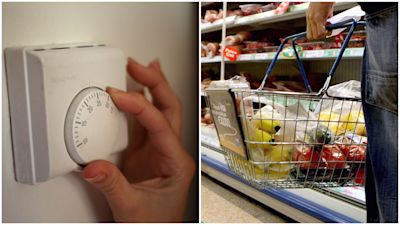Inflation jumps to 2.3% in sharpest increase for two years - what should we make of it?

The ONS said an increase in household energy costs particularly contributed to the latest rise in inflation, as ITV News Business and Economics Editor Joel Hills reports
The annual rate of inflation rose sharply to 2.3% last month. But what should we make of that?
Firstly, it’s not 11.1%.
Two years ago, consumer price inflation was running at double digits. Prices today are much more stable, although they have settled at a much higher level.
Pay is rising at a faster pace than prices and has been for last year, for more than a year, which is good news for living standards.
But, in parts of the economy, inflation is still red hot. Roughly one in five people in the UK rent from a private landlord and private rents are rising at close to 9% a year.
Secondly, inflation is slightly higher than the Bank of England and the financial markets were expecting.
A step-up in Consumer Price Inflation in October was always on the cards because the OFGEM price cap rose at the beginning of the month, increasing the unit price of gas and electricity. But that was chunkier than forecast.
Airfares, the price of clothing and hotels all jumped last month.
According to the Office for National Statistics (ONS), "core" inflation in the UK (which excludes volatile food and energy prices) and "services" inflation (a key target for the Bank of England) also edged up.
So, all three measures moved in the wrong direction.
Thirdly, the Budget means there’s more inflation in the pipeline.
The chancellor hiked the rate of national insurance in her Budget on October 30. She also lowered the threshold above which it is paid.
As a result, from April next year, companies will pay around £800 more in tax for each worker they employ.
I spoke to a business that says the Budget will add £500,000 to its annual wage bill. The owners of the hotel plan to raise their prices to cover the cost. There’s no way of knowing the degree to which other businesses will do the same.
The Bank of England thinks inflation is likely to continue edging up towards 3% over the course of the next twelve months before drifting back down to the 2% target.
If the Bank is right, then clearly that is not a desirable outcome, but neither is it a disaster either.
Subscribe free to our weekly newsletter for exclusive and original coverage from ITV News. Direct to your inbox every Friday morning.
Fourthly, interest rate cuts are likely to be gradual.
At least, that’s the message the Bank of England keeps repeating.
Martin Weale served on the Monetary Policy Committee between 2010 and 2016. He doesn’t think the Budget will prove very inflationary but says the Bank should proceed fairly slowly.
“I think if I were [still] at the Bank, I probably wouldn't be cutting interest rates in December.” He told ITV News. “Inflation isn't a problem at the moment. A slight rise doesn't really matter, but the Bank needs to maintain its credibility and demonstrate its commitment to the 2% target in the medium term.”
The Bank’s view is the direction of travel is still down but there are obvious risks.
The conflict in Ukraine, the conflict in the Middle East and what Donald Trump does next could all have an impact on the cost of living in the UK, for better or for worse.
The markets think the prospect of a cut in December is for the birds. Investors are betting on just two interest rates in 2025.
Have you heard The Trapped? Listen as Daniel Hewitt exposes the UK's dirty secret